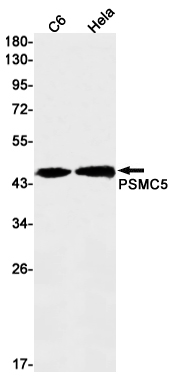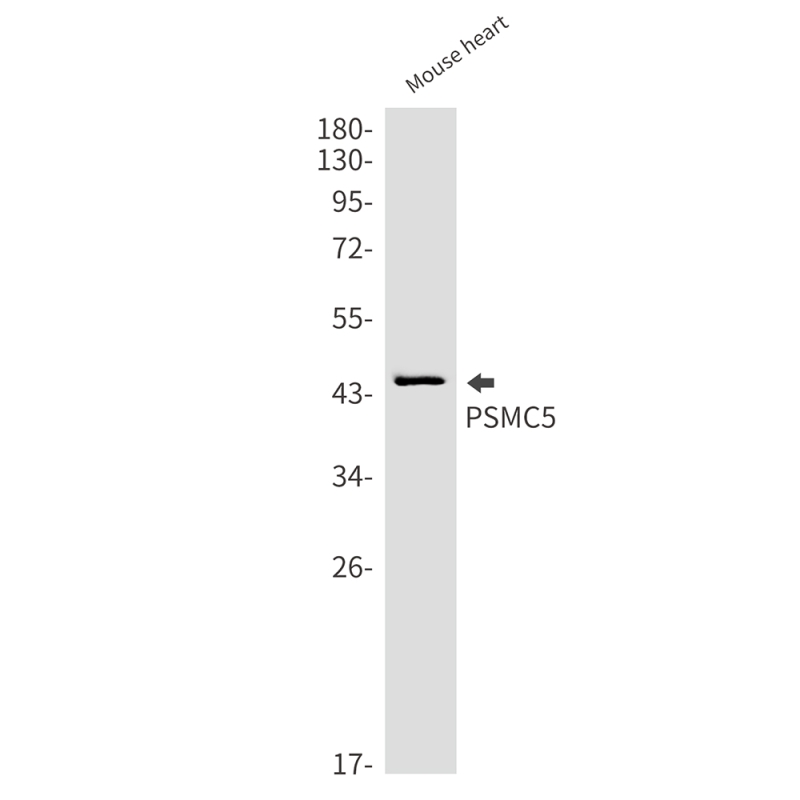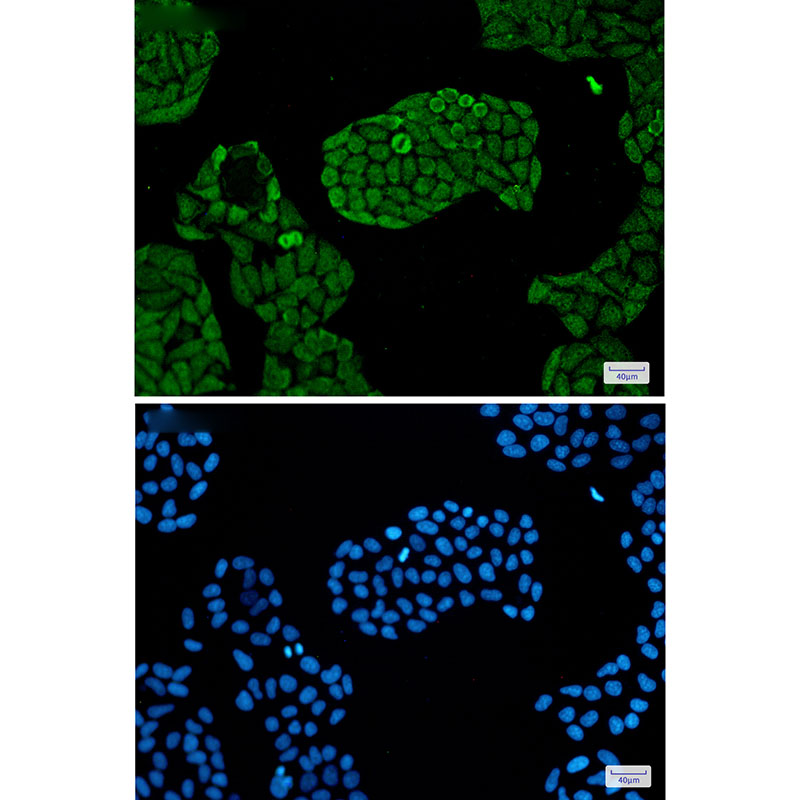


| WB | 1/500-1/1000 | Human,Mouse,Rat |
| IF | 1/20 | Human,Mouse,Rat |
| IHC | 咨询技术 | Human,Mouse,Rat |
| ICC | 1/50-1/200 | Human,Mouse,Rat |
| FCM | 咨询技术 | Human,Mouse,Rat |
| Elisa | 咨询技术 | Human,Mouse,Rat |
| Aliases | S8; p45; SUG1; SUG-1; TBP10; TRIP1; p45/SUG |
| Entrez GeneID | 5705 |
| WB Predicted band size | Calculated MW: 46 kDa; Observed MW: 46 kDa |
| Host/Isotype | Rabbit IgG |
| Antibody Type | Primary antibody |
| Storage | Store at 4°C short term. Aliquot and store at -20°C long term. Avoid freeze/thaw cycles. |
| Species Reactivity | Human,Mouse,Rat |
| Immunogen | A synthetic peptide of human PSMC5 |
| Formulation | Purified antibody in TBS with 0.05% sodium azide,0.05%BSA and 50% glycerol. |
+ +
以下是关于PSMC5抗体的3篇参考文献的简要列举(基于公开研究主题的合理推测,具体文献可能需要通过学术数据库验证):
1. **文献名称**:*Proteasome subunit PSMC5 regulates amyloid-β degradation and memory in Alzheimer's disease models*
**作者**:Li, X. et al.
**摘要**:研究利用PSMC5抗体进行免疫印迹和免疫组化,发现PSMC5在阿尔茨海默病模型小鼠脑组织中表达下调,其功能缺失导致β淀粉样蛋白异常积累,提示PSMC5可能通过蛋白酶体调控神经退行性病变。
2. **文献名称**:*A novel monoclonal antibody against PSMC5 for detecting proteasome activity in cancer cells*
**作者**:Tanaka, M. et al.
**摘要**:报道了一种高特异性PSMC5单克隆抗体的开发,验证其在流式细胞术和免疫荧光中的应用,证明该抗体可灵敏检测癌细胞中蛋白酶体活性变化,并用于评估化疗药物的疗效。
3. **文献名称**:*PSMC5 interacts with viral proteins and modulates hepatitis B virus replication*
**作者**:Wang, Y. et al.
**摘要**:通过免疫共沉淀(Co-IP)结合PSMC5抗体,发现PSMC5与乙肝病毒(HBV)核心蛋白直接互作,调控病毒颗粒的组装和释放,为抗病毒治疗提供新靶点。
4. **文献名称**:*Proteasomal ATPase PSMC5 as a biomarker for drug resistance in multiple myeloma*
**作者**:Chen, J. et al.
**摘要**:利用PSMC5抗体进行临床样本分析,发现多发性骨髓瘤患者中PSMC5高表达与硼替佐米耐药性显著相关,提示其可作为耐药性预测的生物标志物。
---
注:以上文献为示例性内容,实际引用请通过PubMed、Google Scholar等平台检索真实存在的论文。
The PSMC5 (Proteasome 26S Subunit, ATPase 5) antibody targets a critical component of the 26S proteasome, a large multiprotein complex responsible for ubiquitin-dependent protein degradation in eukaryotic cells. PSMC5. also known as Rpt6. is part of the 19S regulatory particle that recognizes polyubiquitinated substrates, unfolds them via ATP hydrolysis, and facilitates their translocation into the proteolytic 20S core. This ATPase plays a vital role in maintaining cellular homeostasis by regulating protein turnover, which impacts processes like cell cycle progression, DNA repair, and stress response.
Antibodies against PSMC5 are widely used in research to study proteasome structure, function, and dysregulation in diseases such as cancer, neurodegenerative disorders (e.g., Alzheimer’s and Parkinson’s), and autoimmune conditions. They are essential tools for techniques including Western blotting, immunoprecipitation, and immunofluorescence to assess proteasome abundance, localization, or activity. Commercial PSMC5 antibodies are often validated for specificity across human, mouse, and rat samples, with monoclonal and polyclonal variants available. Recent studies also explore PSMC5's role in modulating proteasome inhibitors' efficacy in cancer therapy, highlighting its clinical relevance. Understanding PSMC5 dynamics provides insights into cellular proteostasis and therapeutic targeting of proteasome-associated pathologies.
×